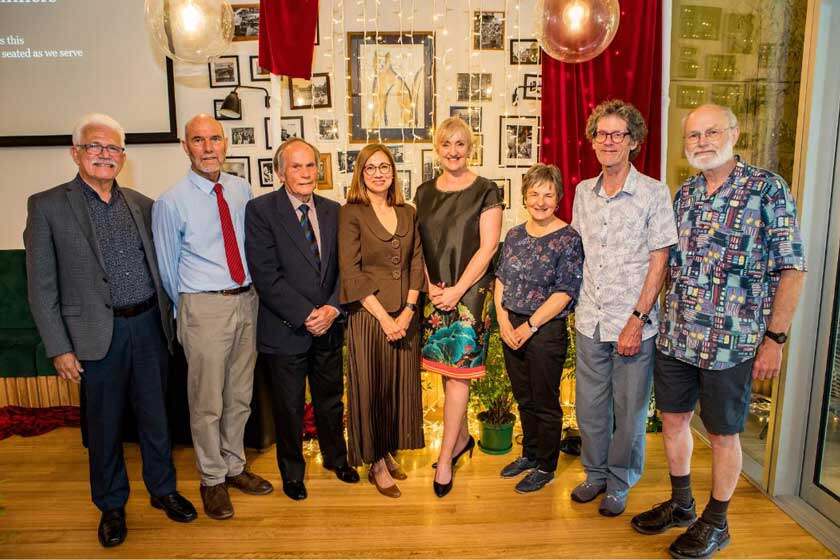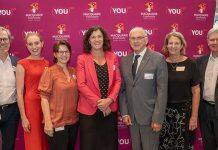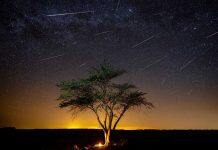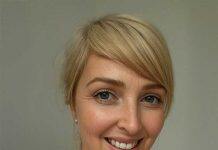Outstanding professors who have retired from the University of Canterbury (UC) over the past year but continue to contribute and inspire have been acknowledged at a celebration event.


UC has appointed seven Emeritus Professors in the last 12 months, including Alison Downard, School of Physical and Chemical Sciences, Keith Alexander Department of Mechanical Engineering, Maan Alkaisi and Phil Bones, Department of Electrical and Computer Engineering, Dave Kelly, School of Biological Sciences, David Norton School of Forestry, and Rob Hughes, School of Psychology, Speech and Hearing.
Emeritus Professor is an honorary title awarded by the UC Council to retiring, long-serving professors who have made an outstanding contribution to their field.
The University’s new Emeritus Professors were celebrated at the Pō Whakamānawa | Celebrating Excellence event held on campus this week to acknowledge the accomplishments of UC academics.
The seven new Emeritus Professors are:
Emeritus Professor Keith Alexander, who retired from UC’s Mechanical Engineering Department in October, has a national and international reputation for product innovation and development, including designing the well-known Springfree trampoline, which prioritises safety. Springfree trampolines have sold over 500,000 models around the world.
During his career he was a design engineer for Hamilton Jet, the Kiwi waterjet company, and worked on the Aquada, a high-speed car that turns into a high-speed jet boat on the water.
More recently he initiated the development of the Kera patient transfer system, a new way to safely transfer people with mobility issues.
Emeritus Professor Maan Alkaisi was a founding member and a principal investigator of the MacDiarmid Institute for Advanced Materials and Nanotechnology from 2002 to 2021.
As a Professor in UC’s Department of Electrical and Computer Engineering, he led the nanotechnology research group and played a significant role in establishing the Nanofabrication Laboratory.
Emeritus Professor Alkaisi’s interests cover nanotechnology science and engineering, solar cells development and fabrication and the interface between physics and biology.
Emeritus Professor Phil Bones worked for 11 years as biomedical engineer in the Department of Cardiology, Canterbury Hospital Board, Christchurch, and two years as postdoctoral fellow with cardiac groups in Europe.
He began working in UC’s Department of Electrical and Computer Engineering in 1988 and retired from teaching in 2021.
His research interests include biomedical engineering, neuromorphic computing, image processing and medical imaging.
Emeritus Professor Alison Downard is an internationally leading electrochemist who was made a Fellow of the Royal Society of New Zealand Te Apārangi in 2014. In the same year she won a prestigious distinction for international scientists, an Honorary Doctorate from Université de Rennes 1, France.
She was a Principal Investigator with the MacDiarmid Institute for Advanced Materials and Nanotechnology (2002-2021) and is a recipient of the Royal Australian Chemical Institute’s RH Stokes medal (2014) which recognises distinguished research in electrochemistry, carried out mainly in Australasia.
Emeritus Professor Rob Hughes spent 57 years teaching at UC. He has research interests in behavioural pharmacology and comparative psychology and has investigated the effects of behaviourally active psychiatric and recreational drugs, especially caffeine.
In recognition of his contribution, he has been awarded Fellowships of the NZ Psychological Society, the Association for Psychological Research and the Psychological Society of Ireland.
His many roles, nationally and internationally, include being a member of the New Zealand Ministry of Transport’s Working Party on Detection of Drug Impairment in Drivers, (1987-89) and a Mental Health Consultant for the United Nations World Health Organization to assess the use and availability of psychotropic medication in Vietnam (1995).
Emeritus Professor Dave Kelly joined Plant and Microbial Sciences (later Biological Sciences) at UC as a lecturer in 1985 and retired at the end of 2021, although he continues to carry out research.
He is known internationally for his study of mast seeding which is a significant conservation issue in Aotearoa New Zealand. His other major research area has been the impacts on pollination and fruit dispersal in the decline in Aotearoa New Zealand’s bird fauna following the introduction of predatory exotic mammals (particularly stoats and rats).
He has collected many awards over his career, including the Te Tohu Taiao award from NZ Ecological Society (2000), Fellowship of the Royal Society of New Zealand Te Aparangi (2002), UC Teaching Award (2011), UC Research Medal (2013) and Hutton Medal (2013).
Emeritus Professor David Norton, who retired from UC at the start of this year, has over 40 years’ experience in Aotearoa New Zealand ecology and conservation biology issues.
His research spans Aotearoa New Zealand’s native forests, conservation and management of threatened plants, and restoration ecology.
Over the last two decades, he has developed a strong relationship with the farming sector, working with farmers, the farming community and sector groups to promote biodiversity conservation and find ways to build this into farm management planning, and he has continued this work in his retirement.







































